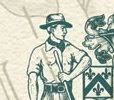Do all programmers speak Sanskrit?
The most commented-on post in 2005 on Scot Adams's blog was Do all programmers speak english?. I read this while setting up a Wiki for my company, thinking that Wiki was the first word of Hawaiian I had learned.
Which got me to thinking about the derivation of words we programmers use. They mostly fall into two groups - classic adaptations and clever neologisms. Where, I thought, are the words borrowed from other languages, adapted for use in computing?
By classic adaptations, I mean someone has gone for a Latin or Greek root and used it for a new purpose. Computer, to take an obvious one, comes from the Latin computare, to reckon. Program from the Greek programma a proclamation.
Some words have a root in other languages. Window is recorded in English in the early thirteenth century. Its first use in the sense of overlapping rectangles on a screen was in 1974. Whereas Menu as a computing term was used in 1967, a mere 130 years after its first recorded use in English (from the French).
The neologisms are where the fun starts. Bit as a contraction of Binary Digit, then Byte for eight bits, and so Nybble for half a Byte. My favourites are copyleft (as opposed to copyright), marketecture (design elements for marketing it, not for using it) and outernet (a.k.a. the real world).
But these words are inventions. Where are the borrowings? Where are the computing equivalents of boss (Dutch), tycoon (Japanese), guru (Sanskrit) or coach (Hungarian), all words we use but in the same sense as everyone else?
You could claim Algorithm, which traces back to al-Khowarazmi, Arabic for the man from Khwarazm, meaning one Abu Ja'far Mohammed Ben Musa, a mathematician whose work on Algebra influenced the use of the Arabic number system in Europe. Or Bot, a contraction of Robot, from a Czech word for forced labour, used by Karel Capek in his play R.U.R. (1920). But both of these had a life in English before computing adopted them.
One I can find is Kludge, which was first used in 1962 as "an ill-assorted collection of poorly-matching parts, forming a distressing whole", yet comes from the German word Kluge, originally meaning smart or witty, according to the Oxford English Dictionary (CD-Rom, 1992, still runs on my wife's computer, can't install it on my computer as I have no 3.5" floppy drive). Or, from the Scots kludge or kludgie for a common toilet, according to the Jargon Wiki.
The second, to go with boss, tycoon etc, is Kahuna, which is Hawaiian for shaman, and shows that Wiki was actually my second word in that language.
Any one got any more?
Meanwhile, I've found a word for the naming of classes by joining nouns together, such as TextBox or ToolBarButtonCollection. Henceforth, this is to be known as the Tatpurusha Class Naming Convention, borrowing the word Tatpurusha which comes from the Sanskrit for his servant and is therefore itself a tatpurusha word. Currently Googling for "tatpurusha class" returns no hits, but it is only a matter of time.
That's it. Forgive me for being such a geek (U.S Slang from 1916), an anorak (Greenland Eskimo, 1934) and a nerd (made up by Dr Seuss, 1950, probably).


<< Home